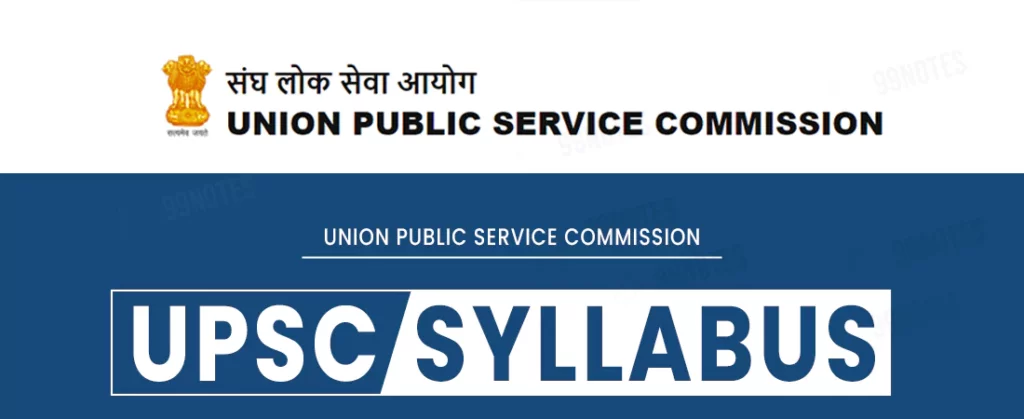Understanding the Comprehensive UPSC Syllabus: Your Key to Success
Are you planning to join the ranks of India’s finest civil servants? Then you’re probably preparing for the Union Public Service Commission (UPSC) examinations, one of the most prestigious and challenging tests in the country. The vast scope of the syllabus is one of the most daunting aspects of these examinations. At 99notes.in, we’re committed to making your journey simpler and clearer. This detailed guide on the UPSC syllabus will aid you in your focused study strategy and bring you one step closer to your dream.
What is the UPSC?
The UPSC is the central agency responsible for recruiting candidates into various services of the Government of India, including the Indian Administrative Service (IAS), Indian Police Service (IPS), and Indian Foreign Service (IFS), among others. The UPSC exam, also known as the Civil Services Examination (CSE), is divided into three stages: the Preliminary Exam (Prelims), Main Exam (Mains), and the Personality Test (Interview).
UPSC Preliminary Examination Syllabus
The Prelims is a screening test that consists of two papers: General Studies Paper-I and General Studies Paper-II (CSAT). It is crucial to note that only the marks scored in Paper-I count towards the cutoff, while Paper-II serves as a qualifying paper.
General Studies Paper-I
The Paper-I focuses on General Awareness and covers topics such as Indian National Movement, History of India, Indian and World Geography, Indian Polity and Governance, Economic and Social Development, Environmental Ecology, Bio-diversity, Climate Change, and General Science.
General Studies Paper-II (CSAT)
The CSAT primarily tests the candidate’s comprehension, analytical ability, logical reasoning, decision-making, problem-solving, and interpersonal skills. It also includes basic numeracy, data interpretation, and English language comprehension skills.
UPSC Main Examination Syllabus
The Mains examination is the second stage, which consists of nine papers. The marks obtained in this stage count towards the final ranking.
Paper-I: Essay
In this paper, candidates are required to write essays on multiple topics. It tests the candidate’s knowledge, analytical ability, and writing skills.
Paper-II to Paper-V: General Studies
These four papers cover a wide array of subjects. Paper-II deals with Governance, Polity, Social Justice, and International Relations. Paper-III is about Technology, Economic Development, Biodiversity, Security and Disaster Management. Paper-IV delves into Ethics, Integrity, and Aptitude. Finally, Paper-V covers topics related to Agriculture, Botany, Chemistry, Civil Engineering, and more.
Paper-VI and Paper-VII: Optional Subjects
Candidates can select two papers from a list of subjects provided by UPSC. The choices include subjects like Agriculture, Anthropology, Chemistry, Geography, History, Political Science and International Relations, Psychology, Sociology, and more.
Paper A and Paper B: Language Papers
These are qualifying papers and the marks are not counted for the final merit. Paper A tests the candidate’s command over one of the Indian languages listed in the Eighth Schedule of the Constitution, while Paper B tests the candidate’s English language abilities.
UPSC Personality Test (Interview)
After clearing the Mains examination, candidates are called for the Personality Test. The interview panel assesses the mental and social traits of the candidates, their intellectual capabilities, and moral integrity. The interview does not have a prescribed syllabus.
Understanding the UPSC syllabus is only the first step in your journey towards a successful career in civil services. On 99notes.in, we provide comprehensive study materials, guidance, tips, and practice tests designed to help you navigate each stage of the examination. Whether you’re at the beginning of your preparation or in the final stages, we’ve got resources tailored for your specific needs.
We encourage you to visit our platform regularly, as we continually update our content to reflect changes in the UPSC syllabus and exam pattern. We’re committed to providing you with the most accurate and timely information to aid you in your UPSC journey.
At 99notes-Best IAS COACHING INSTITUTE, we believe in empowering every aspirant with the right tools to unlock their potential. Let’s conquer the UPSC syllabus together!

